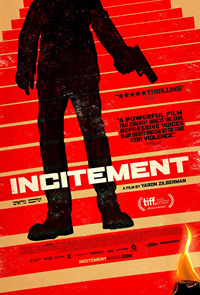Histories of Violence: Zilberman Revisits the Tempest of Infamous Assassination
 Now over twenty years removed from the circumstances which led to the assassination of Israeli Prime Minister Yitzhak Rabin in November of 1995, Yaron Zilberman’s effectual sophomore film Incitement presents a time capsule which charts how the struggle for peace and unity can be regressed dangerously in the blink of an eye. The political ripple effects of what transpired following Rabin’s assassination cemented an ongoing cultural conflict between Israelis and Palestinians, however, Zilberman’s retrospective examination eerily conveys how the metamorphoses and vitriol of right-wing media dangerously normalized hate speak and inspired terror in ways which weren’t acknowledged as harmful at the time—and it’s alarming to note certain parallels with contemporary political factions and their infinite platforms assisted by a twenty-hour-news cycle which has led its devotees, whether through real or fake news, to develop a taste for exaggeration, mayhem and blood. In an attempt to minimize sensationalism, Zilberman crafts an odyssey of a citizen’s radicalization, assisted by religious fanaticism, the news media and troubling ideologies. Less a fall from grace or portrait of a monster, it’s a compelling, mostly matter-of-fact exercise which taps into tension despite the inevitability of where it’s headed.
Now over twenty years removed from the circumstances which led to the assassination of Israeli Prime Minister Yitzhak Rabin in November of 1995, Yaron Zilberman’s effectual sophomore film Incitement presents a time capsule which charts how the struggle for peace and unity can be regressed dangerously in the blink of an eye. The political ripple effects of what transpired following Rabin’s assassination cemented an ongoing cultural conflict between Israelis and Palestinians, however, Zilberman’s retrospective examination eerily conveys how the metamorphoses and vitriol of right-wing media dangerously normalized hate speak and inspired terror in ways which weren’t acknowledged as harmful at the time—and it’s alarming to note certain parallels with contemporary political factions and their infinite platforms assisted by a twenty-hour-news cycle which has led its devotees, whether through real or fake news, to develop a taste for exaggeration, mayhem and blood. In an attempt to minimize sensationalism, Zilberman crafts an odyssey of a citizen’s radicalization, assisted by religious fanaticism, the news media and troubling ideologies. Less a fall from grace or portrait of a monster, it’s a compelling, mostly matter-of-fact exercise which taps into tension despite the inevitability of where it’s headed.
University student Yigal Amir (Yehuda Nahari Halevi) watches in disgust as Prime Minister Yitzhak Rabin shakes hands with enemy and PLO Chairman Yasser Arafat under the guise of President Bill Clinton at the White House in 1993. Born in Israel to a Yemeni family of Orthodox immigrants, Amir has always felt slighted by his heritage, which takes the shape in fanaticism, first rearing its head during his military service. Echoes of this violence are evident in his present-day bouts of anger towards his family, dismaying his mild-mannered father (Amitay Yaish Ben Ousilio). His mother (Anat Ravnizky) feeds into his hostile, revolutionary tendencies and bolsters the importance of sticking with ‘one’s own’ in her attempts to dampen a rather sickly romance with Nava (Daniella Kertesz), his Ashkenazi girlfriend. Planting himself alongside a group of radicals, he whips up an argument for murdering Yitzhak Rabin as the only solution to stopping the state of Israel from passing irrevocably into the hands of left-wing non-believers.
Rabin’s assassination was a watershed moment in Israel’s history, crushing the vision of Israel’s left-wing, which called for an end to the bitter resentment between Israel and Palestine by the proposal to give back territory Israel had lorded over since 1967’s Six Day War.
Israeli auteur Amos Gitai also recently revisited the detrimental tragedy with his 2015 documentary Rabin, the Last Day. Zilberman initially seems a curious choice for the material given his 2012 debut A Late Quartet, which featured Catherine Keener, Christopher Walken and Philip Seymour Hoffman, a poised art-house drama. But his Incitement lands somewhere between the obvious consternation over media’s potential toxicity in Clint Eastwood’s on-the-nose Richard Jewell (2019) and Paul Greengrass’ 22 July (2018), which attempts to show a terroristic act similarly from the perspective of its instigator.
As Yigal Amir, the conservative, Orthodox law student who goes off the rails, Yehuda Nahari Halevi is acutely calm, even cold in his estrangement with a loving (if hypocritical) family, whom he sneers at as part of the Jewish Diaspora, watered down remnants of their ancestors. Much like Zilberman’s film itself, his eventual violence is the methodical end to a myriad of influences, including the dangerousness of interpretation and hearing what one wants hear. Much time is spent on the ‘law of the pursuer,’ a traditional Jewish law dictating one who is labeled as a ‘pursuer’ with the intention of killing another must be extinguished. The catch is, to be enforced, it must be approved by a rabbi, which is something Amir claimed to have obtained. As Zilberman depicts in the film, Amir seeks the counsel of many a rabbi, several who label Rabin as a pursuer but none explicitly approve of the prime minister’s murder.
Expertly interweaving archive footage of the period with Amir’s family and romantic dilemmas, Incitement is also enhanced by a subtle but sinister score from Raz Mesinai, whose last narrative feature he composed for was another terrorist drama, the thorny Sorry, Haters (2005) which starred Robin Wright and Abdellatif Kechiche. Informative even in its conjecture of Amir’s desires and motivations, Incitement is a reflection of an assassination caused by complex issues which have yet to be rightly quelled.
★★★/☆☆☆☆☆


